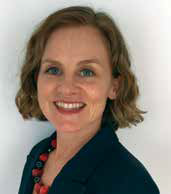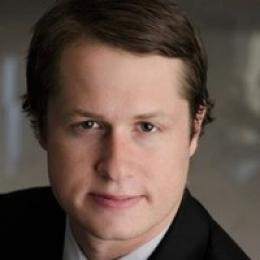
Allison Despard
GENERAL COUNSEL OF LABOR AND EMPLOYMENT, APAC,
HONEYWELL INTERNATIONAL INC.
“What I really like about the APAC region, or an area where labor and employment law isn’t formed, is that you really get a seat at the table with the business to come up with what makes sense,” she says.
The opportunity first arose when she was the senior human resources attorney for Intel Corporation in Santa Clara, California. A colleague was about to return from Hong Kong and she raised her hand to see if the company would send her as a replacement.
“No, we’re hiring locally and we’re going to hire someone who knows the region,” was the response. A hiring freeze abruptly changed things. She got a call back and was on her way to Asia — or, as she likes to think of it — the Wild West of law.
Today, Allison Despard is the general counsel of labor and employment in the Asia Pacific region for Honeywell International, Inc., an American conglomerate that produces all kinds of products — from home thermostats to fluorine chemicals to turbo engines — and sells them to individuals, governments, and large corporations. Her first overseas assignment for Intel brought her to Hong Kong. Currently, she is based in Singapore. Her first position for Honeywell was located in Shanghai. Having multiple placements around Asia broadened her perspective of the region.
Despard likens the region to the Wild West because the laws are still evolving. While labor laws are more developed in Hong Kong and Singapore, in nations like India, China, and Vietnam, it’s still up in the air and most companies exercise caution as a result. Honeywell’s approach has been somewhat bolder. Her CEO encourages her to press boundaries.
Despard, who is responsible for setting employment standards in each country, is urged to try new policies and see how it goes. In this regard, she says, Honeywell is a bit of the bleeding edge. It is exactly why she finds the region so enthralling. “What I really like about the APAC region, or an area where labor and employment law isn’t formed, is that you really get a seat at the table with the business to come up with what makes sense,” she says. “Honeywell stands for this, and this is what makes business sense. This is how you treat employees even if local companies might do something different.”
She always tries to get it right the first time. Some companies will import policies from other countries and try to make them fit. Despard says that’s the wrong approach. “We’re at the forefront of looking at benefits and how we give them in a standardized way,” she explains. It is easier for Honeywell to start with a statutory minimum and then craft it up to add more benefits. This allows employees to move easily. For Honeywell, this is very important because it is constantly acquiring or divesting companies. “I would say that the main driver is because we do have so many different businesses and we do have and really want to grow talent and move talent. If someone has seven weeks of vacation in one country and five weeks of vacation a new country, there’s always a negotiation. If you have standardized benefits, you can just move people more readily.”
Despard is responsible for 36,000 employees in the region. And that number is growing — spread out across 14 nations. There are only two labor and employment attorneys in the region. As a major American conglomerate, Honeywell needs to maintain compliance with the US Foreign Corrupt Practices Act and Honeywell emphasizes code of conduct training to make sure the employees understand the company’s expectations regarding integrity and compliance. Despard developed a certification program for her security and HR team to investigate code of conduct violations. In addition, the company also does face-to-face interactive code of conduct training that has drawn positive feedback. Regardless, it’s Honeywell’s ethos to be consistent across regions.
Her longterm goal is to develop her labor and employment cohort so that one day she will be Despard’s replacement. By that time, ideally, whenever Honeywell enters a new country, the entrance will be seamless.
Chasing the ideal
Despard grew up far from the glowing metropolis of Singapore. Raised near the bucolic fields of Amish country, in Lancaster, Pennsylvania, she idolized her grandfather, who was a small town lawyer. She graduated from William & Mary College in Virginia and later attended Loyola University in Chicago for law school. Despard recommends doing externships in law school. A common critique of the legal education is the lack of real-world experience. At Loyola, she got credit for externships that allowed her to see law in practice.
Despard always had a strong connection to nature and wanted to save the environment. She soon realized that environmental lawyers mostly focus on document analysis and consultation with experts and spend less time hiking through rainforests. Instead, she turned to general litigation. Employment law struck a nerve with her. After all, most people spend a significant part of their lives at work. In short, it’s meaningful work. She also adds that the cases typically move along quickly. A typical case only takes one to two years.
After working for Littler Mendelson, P.C. in Chicago, where she made partner, she decided to go in-house. While she enjoyed trial work, she did not savour bringing in business. She moved to California to work for Covad Communications, a startup that focused on the then-new technology voice-over-IP. “It was probably the biggest education I got anywhere in my career because I went from consulting clients and advising them and litigating to having to know everything like how to defend a worker’s comp claim, or where you have to submit unemployment taxes,” she reflects. She wasn’t supposed to hire outside counsel so she had to learn everything.
After four years, she moved to Intel Corporation, which had its policies and procedures in place. “I had a lot of challenges,” she remembers. She was the HR attorney supporting their worldwide compensation and California litigation. It was only a few months later that her colleague returned from Hong Kong and she fatefully raised her hand to see if she could work in the Asia Pacific region. She’s glad she did.
Getting to Know… Allison Despard
WHAT ARE YOUR HOBBIES AND WHAT DO YOU DO FOR FUN?
I have a seven and an eight year old, two sons, and so my free time I basically spend with them. We really like Singapore and it has amazing nature. They have an incredible park system with lots of activities. They have mangrove forests; they have beaches. So, the dog and the kids and my husband and I are often out in nature in Singapore. We love travel. We’re in the great part of the world to travel so we take some pretty great trips. I try to bring them along maybe once a year on a work trip and then we kind of expand that into a vacation. But my kids are pretty seasoned travelers and we go hiking, we go to the beach, we zip line, we ride elephants — we do all sorts of fun stuff.
DO YOU HAVE A VACATION PLANNED?
Yeah, actually I do because Chinese New Year is coming up. My parents are coming and we’re taking them to Thailand, and then my husband and I are going to the Maldives to dive with whale sharks for our anniversary right after that because my parents will be there to take care of the kids. One of the challenges of being so far from home is having family help out with the kids.
WHAT’S YOUR FAVORITE FOOD?
My dad raised lamb and I’ve always loved it and will order it any time it’s on the menu. But living and traveling in Asia, I am up for anything from Singapore Chili Crab to Xiao Long Bao!




